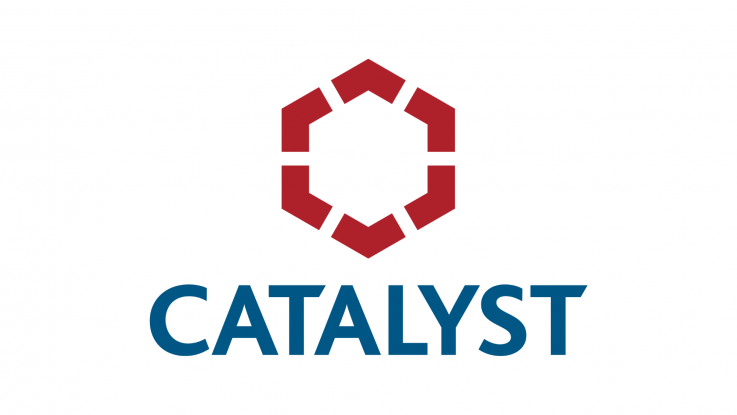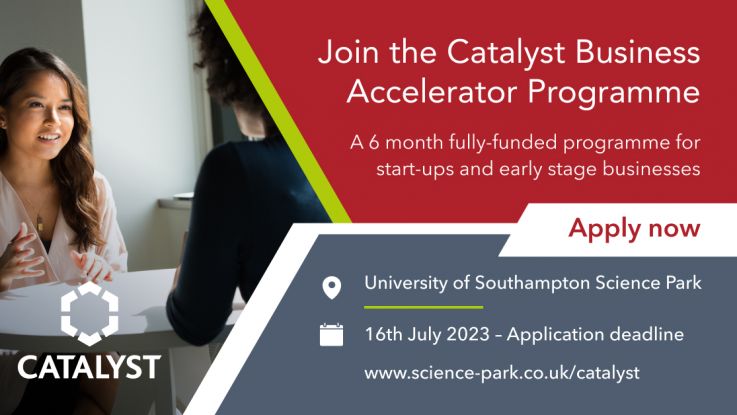

Blazing a trail
The visionary ideas of four budding entrepreneurs captured the imaginations of the Catalyst judging panel, resulting in their companies joining the programme with the aim of fast-tracking their businesses.
Catalyst is an intensive programme of high-level mentoring and commercially focused peer group workshops designed to turn ideas into businesses with real world impacts.
Here’s how the 2018 Catalyst cohort plan to make their mark.
C Squared Visions has created a fast, highly secure, cloud-based system to give manufacturing organisations complete visibility of their production line processes and outputs. With both web-based and desktop user interfaces, it delivers an optimised view tailored to a range of stakeholders’ needs.
Any automated manufacturing organisation could use this technology because manual quality control in a production environment can result in variable efficiency and quality standards, both of which potentially impact cost, productivity and profit.
Founder, Zhonglun Cai, said: “As a principal engineer previously, I decided to apply to Catalyst to give me greater insight into business development and operations to complement my technical ability to develop products. I was excited and honoured to be accepted onto the programme. It proved to me that we have a business case rather than just an idea. Key to our development will be getting the balance right between developing a product and delivering what customers need while making it profitable.”
Optomel has developed radically new optical filters that have the potential to revolutionise any technology that is based on photonics. Flexible, conformable and scalable to very large volumes, the breakthrough will enable various industries to venture into new applications and expand markets.
Optical filters underpin everything from diagnostic devices in doctors’ surgeries through to drone cameras, satellite imaging, autonomous cars and environmental monitoring - in fact, almost any application that manipulates light needs a filter. However, traditional sophisticated optical filters require very complex processing; they are extremely expensive and have limitations on their performance so that, even in high volumes, some applications render them simply uneconomic. Optomel’s approach uses self-organised materials to create similar optical effects but with a simpler, non-vacuum process, meaning that filters can be produced more economically, on a greater scale and with a wider variety of uses.
Founder, Dr Damian Gardiner commented: “I felt great to be accepted onto the Catalyst programme. Southampton Science Park really is a natural home for Optomel and Catalyst is excellent for technology businesses. The weekly workshops have already proved to be really helpful discussions with the other participants and the mentors. There is a real buzz and excitement around new companies and it's fantastic to be a part of it! By the end of the programme, I would like Optomel to be viewed as a truly scalable, high volume opportunity: one which simply wasn't possible with existing technology and one that will make a significant difference to people's lives.”
Signly radically improves access to essential printed information for deaf sign language users. It does so by augmenting print with a layer of sign language on the user’s own device: simply open the app, point your device at the Signly-enabled printed material or barcodes and signed content will appear as if by magic. This smart layer of signed or spoken filmed digital information animates, translates and invigorates the user experience as well as making essential information accessible.
Many deaf sign language users consider sign to be their first language and English second. Often experiencing lower literacy levels, which can be as low as those of eight/nine year olds, this group is effectively excluded from accessing information in print, online and face-to-face. For example, an undiagnosed deaf three year old knows about 25 words, compared to 700 words for a hearing child.
Founder, Mark Applin, said: “Having worked in the corporate digital arena for 17 years, I often pondered how innovation could make life better. Whilst I do not have a career background in access and inclusion, I do have a passion for communication, digital problem solving, inclusive design and boundless energy and enthusiasm for change! I did a little dance round the office (no witnesses to that fortunately) when I was informed that I was joining the Catalyst programme. I hope that by the end of the process I will have a robust, documented strategy, a decent product roadmap and I’ll be starting to pitch to potential partners.”
YouSeq manufactures high quality consumables for DNA sequencing applications based on Next Generation Sequencing (NGS) technology but with a simplified experimental work flow and unparalleled customer support to effectively deskill the process.
The current NGS consumables market is US$3.6bn, dominated by big multinational companies charging premium prices for their products. The technology is rapidly being used for diverse applications and the market is growing at 20% each year. However, NGS workflow is currently considered to be cumbersome and it requires high level scientific training. YouSeq’s solution is expected to have a big impact on the product experience across a wide range of biomedical research and development programmes.
Founders, Jim Wicks & Anoop Pillai, commented: “We’re currently actively working on market positioning and product development with a view to starting selling by March 2019. We have also recruited our first employee to accelerate our launch strategies and operational capabilities. We were really excited and thrilled to be told we were coming to Catalyst. Having an open plan office and working with the other companies on the programme will be a great experience. We can share good practices and support each other to achieve our objectives. By the end of the programme we would like to have generated sufficient market interest to fuel our future product development and growth plans.”















































































